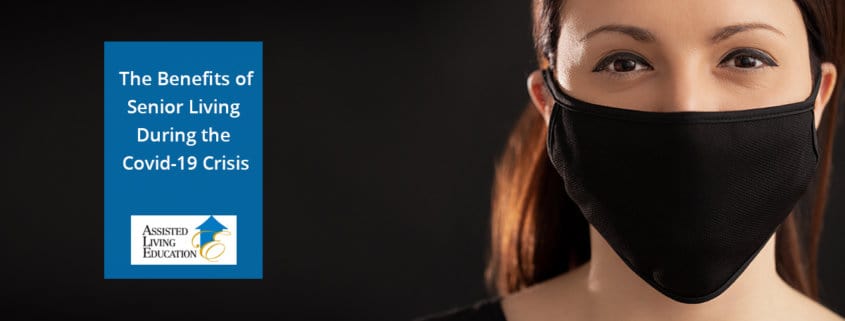The Benefits of Senior Living During the Covid-19 Crisis
Senior living will always play an important role in the healthcare process of aging adults and despite some unflattering media attention, most Residential Care Facilities for the Elderly (RCFE) are actually doing well with the Covid-19 crisis. Many have been able to keep their facilities COVID-19 free, providing their residents with a safe and secure home, while the country works hard towards long term solutions to this pandemic.
Even with a COVID-19 free environment, this does not change the fact that the conversation in regard to bringing on new residents has started to evolve. To help ensure that your facility is ready for this change and some of the questions that will follow, we at Assisted Living Education (ALE) have put together some information that can help guide your teams as society begins to move forward.
National Voice For A Change of Narrative
While it is true that some Assisted Living Facilities across the country have been impacted, most facilities have quickly adapted to the safety guidelines and have continued to provide excellent care with very low risk to their residents. Communities with a negative COVID-19 population are often overlooked because this fact is not as newsworthy. To illustrate this, Seniors Better Together, a Seattle-based cooperative, has launched a national marketing campaign. Their intention is to communicate the safety and benefits of elderly care and assisted living facilities during this time. Here at ALE we are supportive of these industry voices and feel that a proper communication strategy is important to the success of any well managed RCFE.
Utilizing a Positive Messaging Strategy
Like many RCFE administrators, you are probably in the process of updating your marketing materials to address the current reality of things. Through this process of communicating the safety, efficacy, and benefits of senior living during the pandemic is more crucial than ever, so we’ve put together some high level takeaways for you here.
1. Senior Living Communities Are Safe
Safety is the most important message to communicate effectively and compellingly right now. Let the public know that you follow the Centers for Disease Control’s guidance and incorporate best practices into your procedures related to COVID-19. Another safety aspect to include is visitor limitation, sanitization, virus specific training and specific protocols you have in place to ensure the safety of your residents. Finally, assure prospective clients that you have ample long-term supplies of PPE and other supplies that may be reduced in quantity to the regular public.
2. Elderly Care Facilities Promote Safe Socialization
Seniors sometimes battle loneliness and feelings of isolation, especially during periods of quarantine that come along with a pandemic. In residential living, there are opportunities for safe socializing and community living. Teams take all the necessary precautions to sanitize and effectively mitigate the risk that comes with community living, while also allowing opportunities to be active and engaged. Since isolation is linked to adverse mental health outcomes, especially for the elderly, sharing your strategies on interpersonal communication and engagement help both new and existing residents feel more comfortable.
3. Trained Medical Professionals Oversee Medical Safety
There is always some level of risk for COVID-19, but with the proper precautions and oversight, that risk can be mitigated. When using on-site medical professionals, residents can be seen, diagnosed, and treated more quickly and with less exposure than when traveling to see a primary care physician. This results in more active monitoring and faster treatment. Medical teams and residential staff are also better equipped to sanitize and execute CDC policies that protect the most vulnerable population. The end result is improved quality of care with less risk to exposure.
4. Care Facilities Allow for Exercise and Physical Activities
Physical activity among the elderly is directly related to mental and emotional health. In assisted living communities, clients can choose to participate in a variety of exercise programs such as stretch daily, walks, virtual and non-virtual activities. A senior living at home may not feel a need to exercise or does not have someone to motivate them to get up and move. It is important to explain to prospective residents the importance of staying active even while faced with the obstacles of social distancing and how important that is to their wellbeing.
5. Families Can Focus on Relationships as Opposed to Care
When an aging family member moves into an assisted living community, the adult children are often relieved that there is now a partner to assist their loved one. Many families experience a loss or reversal of their roles within the family unit. Relationships might be strained, as many adults do not want their children telling them what to do. Many families find that by letting go of the care aspect of providing for their loved one, they can shift and realign themselves with their loved one’s Providing care, supervision and observation gives many families peace of mind, making residential facilities one of the best options for their relationship that need full time care. As an added benefit these communities provide an environment for parents and children to interact in a more meaningful way that may reduce family tensions.
Senior Living Is Still a Safe and Viable Option
Information about COVID-19 changes rapidly, and all senior living communities should be dedicated to staying informed. Understanding and taking ownership of the information being used in your marketing and communications is key in this process. The process ensures that prospective residents and their families have the most relevant information available to them so they can make the best decisions possible. When managed correctly with proper safety precautions, RCFEs are still among the best solutions for providing a high level of care, comfort, and most importantly safety to those that need it the most.
If you or your RCFE is looking for guidance during this difficult time please don’t hesitate to reach out to Assisted Living Education. We are here to help and support our clients and their businesses.



